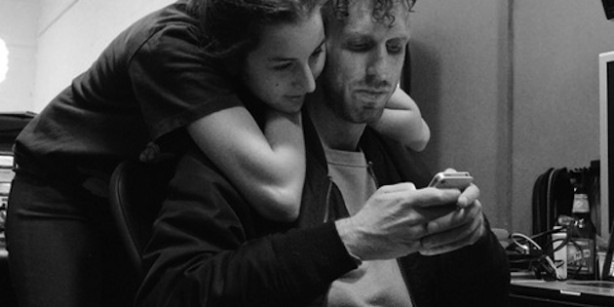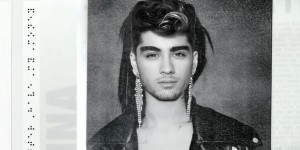 Music
Music
Producer Ariel Rechtshaid was pop music's secret weapon in 2013
by Ryan McNutt
December 17, 2013
Alana Haim and producer Ariel Rechtshaid
The two longest-reigning songs at the top of Billboard’s Hot 100 chart this year were, unsurprisingly, “Blurred Lines” (12 weeks) and “Royals” (nine weeks). You could sum up the pop story of 2013 in those two songs alone: a producer-driven monster retro hit designed to turn a mid-level R&B crooner into a mega star, replaced at year’s end by a personality-driven piece of pop minimalism that seemingly came out of nowhere.
But buried between these two narratives, just a bit below the upper reaches of the pop charts, you’ll find the producer who might prove to be the true breakout pop voice of 2013.
The irony in that statement is that, a) Ariel Rechtshaid is a producer, and b) unlike the peers he’s up against for the Producer of the Year (non-classical) Grammy next month, you’d be hard pressed to pick out one of his songs if you didn’t know what you were looking for. In every interview, the 34-year-old Los Angeles producer goes through great effort to point out that he doesn’t have a “signature sound” — in contrast to, say, a Pharrell or a Dr. Luke — and, more importantly, he doesn’t want one. “I’m more interested in going tit for tat with the artist,” he told Pitchfork last month. “I like to find an artist who inspires me and get into their world and challenge them.”
His resumé of challenges this year reads like a murderers’ row of compelling pop records, from full-length debuts by Sky Ferreria, Charli XCX, and Haim, to Vampire Weekend’s stunning Modern Vampires of the City, to the Snoop Lion reggae record. (Reincarnated is, by a good margin, the weakest of these, but I’d still call it compelling even in its shortcomings.) There’s slightly more common sonic ground between these records than Rechtshaid might suggest, but there’s no question that it’s a diverse set of projects.
One thing they all share, despite their differences, is Rechtshaid’s heavy involvement, producing most (if not all) of the albums’ tracks. He’s no stranger to the one-and-done production job; he has a sole credit on Justin Bieber’s Believe, and his contributions to Usher’s brilliant “Climax” are part of what made him so in-demand this year. But his preference is to work closely with an artist over the course of an entire album. Perhaps because of this, each of these records feels surprisingly human — genuine expressions of personality and feeling — despite the fact that they’re doused in transparently digital manipulations. They’re mechanized pop albums with real beating hearts.
In the age of pop machines, Rechtshaid is emerging as our new, most promising creator of cyborgs.
Rechtshaid’s first big production breakthrough was about as un-robotic as they come: the surprising number-one hit “Hey There Deliliah” by Plain White T’s. The quaint little earworm — no doubt stuck in your head as you read this; my apologies — is pretty much a straight acoustic ballad buttressed by some polite strings.
Compare it to some of the best work Rechtshaid touched in 2013: the drum-plus-handclap beat driving Vampire Weekend’s transcendent “Ya Hey”; the choppy cymbal hits of Haim’s “Forever”; the thundering kit sound that opens Sky Ferreira’s “You’re Not the One.” As different as these projects are, what they share is a commitment to compelling rhythmic hooks as much as melodic or lyrical ones. In an interview with Mix magazine, Rechtshaid talks about the variety of drum sounds on Modern Vampires of the City, explaining that, “Some of the drums you call ‘impossibly’ shockingly are a real human being, and some of the simple stuff isn’t.”
There’s more insight into Rechtshaid’s production philosophy to be found in a lengthy profile published by Grantland recently. “Most of what he does happens behind a computer screen,” writes Mike Powell, “where he can shift pitch, cut and paste, tweak, filter, and transform an instrument as familiar as the human voice into a sound a person could never make.” Even a track that starts with four or five people playing in a room, “ends up as hundreds of unrelated bits of sound bolted together at a desk.”
None of this is inherently novel; producers who blur lines between human and machine are par for the course in 21st century pop. For example, Lukasz “Dr. Luke” Gottwald — as evidenced by Miley Cyrus’ “Wrecking Ball,” probably still our greatest evil pop maestro — has made an entire career out of using compression to confuse the timbre differences between vocals, keyboards, guitars and drums, in the process creating something powerfully uniform. Yet a great deal of Gottwald’s work ends up feeling cold and robotic, even if his sonic manipulations clearly deserve respect. Take, for example, 2010 — the year of “Peak Luke” — when between “Tik Tok,” “California Gurls” and “Dynamite,” it genuinely felt like he trying to perfect the exact same composition throughout the year. (The entire writing/production discography of OneRepublic’s Ryan Tedder is another great case-in-point, epitomized by the time when Kelly Clarkson realized that her song “Already Gone” was basically the same as another Tedder creation, Beyonce’s “Halo.”)
What distinguishes Rechtshaid’s work this year is that as compelling as his sounds are, they’re leveraged in the service of pop records that are big on feeling. Where Vampire Weekend could once be dismissed as a formalist exercise (albeit a pretty great one), Modern Vampires of the City is a weighty record, with Rechtshaid and co-producer Rostam Batmanglij pulling off everything from raucous joy (“Diane Young”) to solemn hopelessness (“Hannah Hunt.”) Sky Ferreira, signed to Capitol as a teenage pop star, was in the midst of a singer/songwriter-type record with Jon Brion when Rechtshaid came along; together, they crafted a messy, abrasive pop record that sneers with a tinge of sadness. On both, you can hear the transparent manipulations — from the drums to the vocals — but they seem in perfect service of the human emotions on display, rather than separate from them.
Even at their best, I can’t say that about most of the work that comes out of producers like Pharrell, or Dr. Luke, or Timbaland. That’s why I use the phrase “cyborg” to describe Rechtshaid’s work this year. Rather than prioritize the machine, transforming human creations into robots, he offers little sense as to where the (wo)man begins and the robot ends. It’s akin to how Donna Haraway describes cyborgs in her you-read-it-in-undergrad-English feminist classic “The Cyborg Manifesto”: “a kind of disassembled and reassembled, postmodern collective and personal self.” Performers like Robyn and Janelle Monáe have made cyborg imagery part of their persona — and in the case of Robyn, arguably her sound as well — but Rechtshaid brings this sentimentality into the producer’s role, ripping apart sounds and rebuilding them in such a way that the stitches between flesh and circuitry are unidentifiable.
Another common soundbyte in Rechtshaid’s recent interviews is that he’s “anti-retro.” “My quest has always been to make music that sounds like nothing else you’ve ever heard,” he told Fact Magazine.
In one sense, it’s a strange comment (and not just because he began his music career as a ska-punker in The Hippos in the late-90s), but there’s a shred of truth buried inside it. In his Grantland profile, Powell challenges Rechtshaid’s claim that he wants to make “groundbreaking” records and provides a far more compelling explanation of what’s actually going on in his productions: it’s actually “weirder, more interesting, and more suited to a moment when most new things just seem like combinations of old ones: He takes you back to a place you think you’ve been and makes you feel like you’ve never seen it before.” In other words: Rechtshaid isn’t just remixing the past, but genuinely rewriting it for the modern age.
In a Retromania era, this is noteworthy. And that’s why, although Modern Vampires of the City is the best record Rechtshaid worked on this year, Haim’s Days Go By might be his greatest accomplishment. The California band’s antecedents are incredibly transparent and obvious; just try and find one review of the album that doesn’t mention Fleetwood Mac. Much of the album’s appeal comes from the fact that it’s the sort of guitar-based pop album that’s simply not commonplace in this day and age.
But Days Go By is no simple nostalgia play, and that’s where Rechtshaid’s influence comes in. The record’s drum sounds are decidedly modern, chopped and sliced to the point where their timbre gains a bright, metallic sheen. But that’s only half of the album’s success; the other is in the vocals. Rechtshaid wisely realizes that the sisters’ voices are as adept at rhythm as they are at melody, and weaves their stattico phrasings brilliantly alongside the drum tracks on sharp, biting tracks like “The Wire” and “Let Me Go.” The result is a record of great pop songs that echoes records and sounds you’ve heard before, skewed in a genuinely novel direction.
The songs also feel genuinely collaborative, which brings us back to Rechtshaid’s lack of a “signature sound.” The fact that Modern Vampires of the City still sounds like Vampire Weekend — and that the Haim/Sky Ferriera/Charlie XCX albums all feel unique from one another — suggests that Rechtshaid is not a controlling creative force on these projects, but neither is he a passive one. In this (alongside peers like ex-Solange collaborator Dev Hynes), he presents a model of production that complicates the two dominant pop archetypes: the vibe Svengali (the Rick Rubin”) on one end, and the sound-for-hire (the Dr. Luke) on the other. As with his balancing of humans and machines, Rechtshaid operates in-between our expectations, carving out a space of his own this past year.
Rechtshaid’s onto other projects — he’s currently working on the solo debut from Dirty Projectors’ Amber Coffman — and time will tell how much influence his work this year has on other producers and artists. But as someone drawn to pop voices, I can’t help but find his influence this year incredibly promising. “The cyborg is a condensed image of both imagination and material reality,” writes Haraway, “the two joined centres structuring any possibility of historical transformation.” With the history of music at our digital fingertips, we’ve spent the past decade-and-a-half obsessed with remixing or repurposing the past. In Rechtshaid’s cyborg sounds, one begins to hear the start of an actual pop future being written.
Tags: Music, News, ariel rechtshaid, Charli Xcx, HAIM, Sky Ferreira, Vampire Weekend





